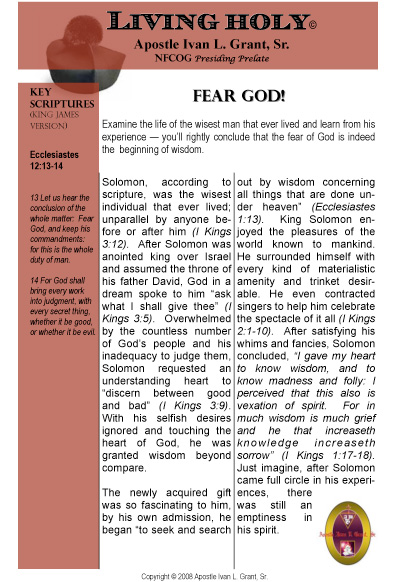Let us hear the conclusion of the whole matter: Fear God, and keep his commandments: for this is the whole duty of man. For God shall bring every work into judgment, with every secret thing, whether it be good, or whether it be evil.
Ecclesiastes 12:13,14
Solomon, according to scripture, was the wisest individual that ever lived; unparalleled by anyone before or after him (1 Kings 3:12). After Solomon was anointed king over Israel and assumed the throne of his father David, God in a dream spoke to him “ask what I shall give thee” (1 Kings 3:5) Overwhelmed by the countless number of God’s people and his inadequacy to judge them, Solomon requested an understanding heart to “discern between good and bad” (1 Kings 3:9). With his selfish desires ignored and touching the heart of God, he was granted wisdom beyond compare.
The newly acquired gift was so fascinating to him, by his own admission, he began “to seek and search out by wisdom concerning all things that are done under heaven” (Ecclesiastes 1:13). King Solomon enjoyed the pleasures of the world known to mankind. He surrounded himself with every kind of materialistic amenity and trinket desirable. He even contracted singers to help him celebrate the spectacle of it all (1 Kings 2:110). After satisfying his whims and fancies, Solomon concluded, “I gave my heart to know wisdom, and to know madness and folly: I perceived that this also is vexation of spirit. For in much wisdom is much grief and he that increaseth knowledge increaseth sorrow” (1 Kings 1:17,18). Just imagine, after Solomon came full circle in his experiences, there was still an emptiness in his spirit.
The preacher left a resounding warning to every believer — not to make the same mistake he did. He admonished the church of today to reverence, honor, respect (fear) God and stand in awe of His holiness and righteousness. In doing so, the commandments of God will be “hidden in the heart” and performed with ease. This is not an option left for individual decision, but rather a duty required by God. God is all-knowing and will judge the secrets of every heart, “whether it be good, or whether it be evil” (Ecclesiastes 12:13-14).
First, God must be worshiped in “spirit and in truth” (John 4:23-24). The believer must have the spirit of Christ (Romans 8:9b) and must agree that God’s word is truth (Amos 3:3; John 8:32).
Second, faith must be exercised in all areas of life and is the only thing that pleases God (Hebrews 11:6). Faith accepts what God says and what He has promised as true and real (Romans 4:20-21).
Lastly, God’s people must always stay in communication (prayer) with their Creator (Luke 18:1; 1 Thessalonians 5:17). Prayer is commanded by God, it exhibits faith in God and destroys the enemy’s strongholds (1 Corinthians 10:4).
Observer Solomon’s wisdom contrasting the fear of the Lord as opposed to his own folly, “the fear of the Lord tendeth to life: and he that hath it shall abide satisfied; he shall not be visited with evil (Proverbs 19:23).

Our monthly email newsletter keeps you up to date with the Nation of NFCOG.